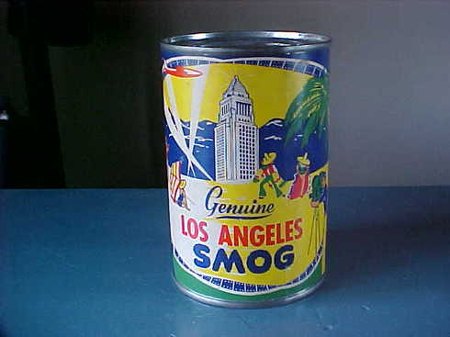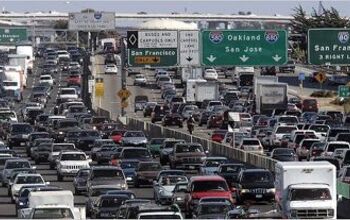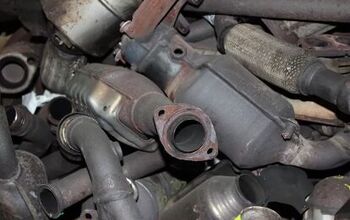CA Sues EPA Over CO2
Thank you United States Congress, for not clarifying who has the ultimate authority when it comes to setting fuel economy standards. And thank you President Bush, for not holding Ms. Pelosi and Co.'s feet to the proverbial fire on this point re: the new Energy Bill– as you'd promised when you sent the bill's framers back to highlight and delete taxes on the oil industry. 'Cause here we are at the inevitable result: California and its 15 clean air groupies (Arizona, Connecticut, Delaware, Illinois, Maine, Maryland, Massachusetts, New Jersey, New Mexico, New York, Oregon, Pennsylvania, Rhode Island, Vermont and Washington) suing the EPA to claim the right to regulate automotive CO2 emissions and, thus, fuel economy. According to the Governator (via The New York Times), the EPA refusal to grant The Golden State the necessary waiver is, as Californians like to say, some heavy shit. “It is unconscionable that the federal government is keeping California from adopting new standards." Arnie's apoplexy inspired Gloria Bergquist, vice president of the Alliance of Automobile Manufacturers, into double negativity. “Congress approved an energy bill that will result in 30 percent reduction in carbon dioxide over the next 12 years… So it isn’t a question of California not having a reduction.” It isn't?
More by Robert Farago

































Comments
Join the conversation
Lack of leadership from the federal level precipitated this. As you point out, RF, they should have seen it coming, but choose to play dumb anyway. Where did we see that before? Washington DC has been backboneless for a while now, hasn't it? There are a number of big states in that group. They must represent a big chunk of the total US population (40? 45?). So, they speak for a lot of people, even if Lumbergh21 isn't one of them.
Stanford scientist produces first-ever study linking increased mortality specifically to carbon dioxide emissions By Louis Bergeron A Stanford scientist has spelled out for the first time the direct links between increased levels of carbon dioxide in the atmosphere and increases in human mortality, using a state-of-the-art computer model of the atmosphere that incorporates scores of physical and chemical environmental processes. The new findings, to be published in Geophysical Research Letters, come to light just after the Environmental Protection Agency`s recent ruling against states setting specific emission standards for this greenhouse gas based in part on the lack of data showing the link between carbon dioxide emissions and their health effects. While it has long been known that carbon dioxide emissions contribute to climate change, the new study details how for each increase of 1 degree Celsius caused by carbon dioxide, the resulting air pollution would lead annually to about a thousand additional deaths and many more cases of respiratory illness and asthma in the United States, according to the paper by Mark Jacobson, a professor of civil and environmental engineering at Stanford. Worldwide, upward of 20,000 air-pollution-related deaths per year per degree Celsius may be due to this greenhouse gas. ``This is a cause and effect relationship, not just a correlation,`` said Jacobson of his study, which on Dec. 24 was accepted for publication in Geophysical Research Letters. ``The study is the first specifically to isolate carbon dioxide`s effect from that of other global-warming agents and to find quantitatively that chemical and meteorological changes due to carbon dioxide itself increase mortality due to increased ozone, particles and carcinogens in the air.`` more at http://news-service.stanford.edu/pr/2008/pr-co-010908.html
This lawsuit is the right step forward for this issue. It is up to California and the other states (a total of 1/3 of them overall, and the majority of the current population) to take action on this issue. The automotive industry has fought every change/reform throughout its history (look up how strongly they fought mandatory seat belts! They claimed it would destroy them through high cost). As for the earlier comment of “1 nation 1 standard”, I must respectfully disagree. With a nation as large and diverse as the United states, there are many standards that regulate many issues.
What people may not recognize is that California has long had higher emission standards (once again, the auto industry cried foul, then turned around and began using those higher standards nationwide). California is the largest car market in the United States, so it is unlikely that the car industry would retaliate by not selling cars there.
As for 16 states requiring stricter standards, this in no way violates the U.S. Constitution. Congress regulates commerce, and states can tighten laws. The new regulations being asked for by California are already going in to effect up in Canada as well as already being in place in Europe. Even China (a gross polluter) has taken steps in have better fuel and emissions standards.
It is time for the U.S. to act like a leader and affect positive change on this issue. The auto industry is under no threat (we still need/want cars) and will do just fine running on cleaner, more efficient cars.